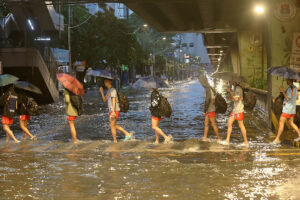Filipino youth worry about climate change, education — survey
AROUND 44% of young Filipinos expect future generations to be “worse off than today,” amid rising concern over climate change, education and lack of jobs, according to a survey by the United Nations Children’s Fund (UNICEF). Results of the U-Report survey also showed 37% of Filipino youth think the next generations will be “better off […]

AROUND 44% of young Filipinos expect future generations to be “worse off than today,” amid rising concern over climate change, education and lack of jobs, according to a survey by the United Nations Children’s Fund (UNICEF).
Results of the U-Report survey also showed 37% of Filipino youth think the next generations will be “better off than today” while 19% believe conditions will be the same.
“While youth are split on whether the future generation is “worse off” or “better off” (44% vs 37%) they do see the value that rapid technological innovations and democratic access to information can bring,” UNICEF said in a statement.
According to the survey, 26% of young Filipinos see climate change, including natural disasters, as the biggest problem they will face in the future.
Also, 23% of respondents are concerned they will not be able to finish their education, while 22% are worried about finding a job and about their health (both physical and mental).
The results of the survey were released ahead of the Summit of the Future 2024 in New York on Sept. 22-23.
“The U-Report findings reveal the sobering, yet hopeful outlook young people have about their prospects for the future,” UNICEF Representative to the Philippines Oyunsaikhan Dendevnorov was quoted in a statement.
“We should listen to what they have to say and work together to address these issues so that every child is cared for, protected, and given a fair chance in life,” she added.
The U-Report poll was conducted online from June 13 to July 14, 2024. Of the 3,109 respondents, 44% were aged 15-19 and 37% were aged 20-24.
Asked what the biggest obstacle will be to getting their dream job or starting a business in the future, 33% of respondents were worried about the lack of jobs for people without experience.
Another 26% were concerned about the economic situation, while 20% said access to a good education is hampering their prospects.
Asked what they will do if given a chance to be the Philippine president, respondents said they will prioritize education, health and the economy to build a better future. They also want to address corruption as well as issues related to agriculture, poverty, and the environment.
“New generations are bringing a reinvigorated sense of solidarity and a compelling call for collective action. Both are essential to build the future we want,” UN Philippines Resident Coordinator Gustavo González was quoted as saying.
The survey also showed the majority, or 69%, of respondents said the United Nations (UN) is “very important’ in creating a better future for them as well as for future generations.
“Every young person’s concern has always been to finish their studies and find a job good enough to support their families. This is a fundamental aspiration, as quality education has a real corresponding impact on the quality of jobs offered to the youth in the future,” Terry L. Ridon, a lawyer and former party-list lawmaker, said in a Viber message.
The Philippine government should address climate-related challenges, Mr. Ridon said. It must also bolster measures to boost job generation and expand access to quality education. — Beatriz Marie D. Cruz
















